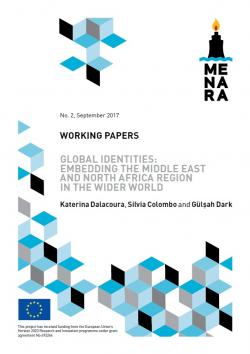Global Identities: Embedding the Middle East and North Africa Region in the Wider World
This paper outlines the ways in which the Middle East and North Africa (MENA) region has been embedded in global identity processes and structures in the post-2011 period. It assesses MENA social and political developments in relation to global ideational and identity factors. Important among these is the imagined yet increasingly widespread and pernicious idea of a clash between “Islam” and “the West”, (mis)conceived as homogeneous identities. However, as the paper shows, global or universalist identity perceptions, in the form of support for human rights and democratic values, also influence the MENA region. Dynamic global youth identities and cultures also influence an exceptionally “young” region and vie for the loyalty of youth against other identities. Changing dynamics of ethnic and religious identities among diasporas, which link the region with the wider world, modify social and political contexts within the MENA, especially some of its post-2011 conflicts.
-
Details
Roma, IAI, September 2017, 24 p. -
In:
-
Issue
Working Papers 2
Introduction
1. “Islam” versus “the West”
2. Global Identities and Universal Democracy and Human Rights Norms
3. MENA Youth at the Intersection of Regional and Global Identities
4. Ethnic and Religious Diasporas: Connecting Global and Regional Identities
Conclusion: The Impact of Global Identities on MENA Politics and Policies
References



